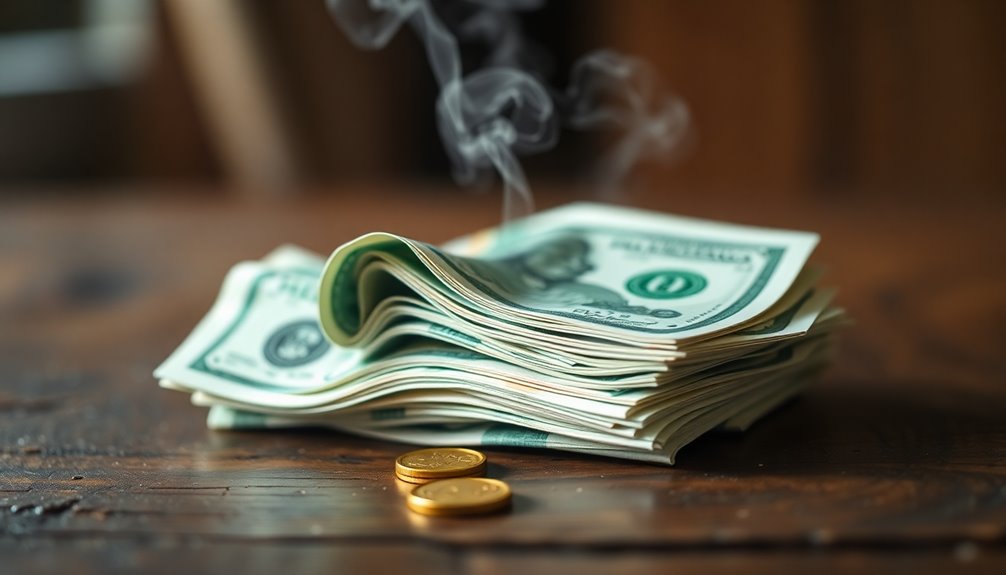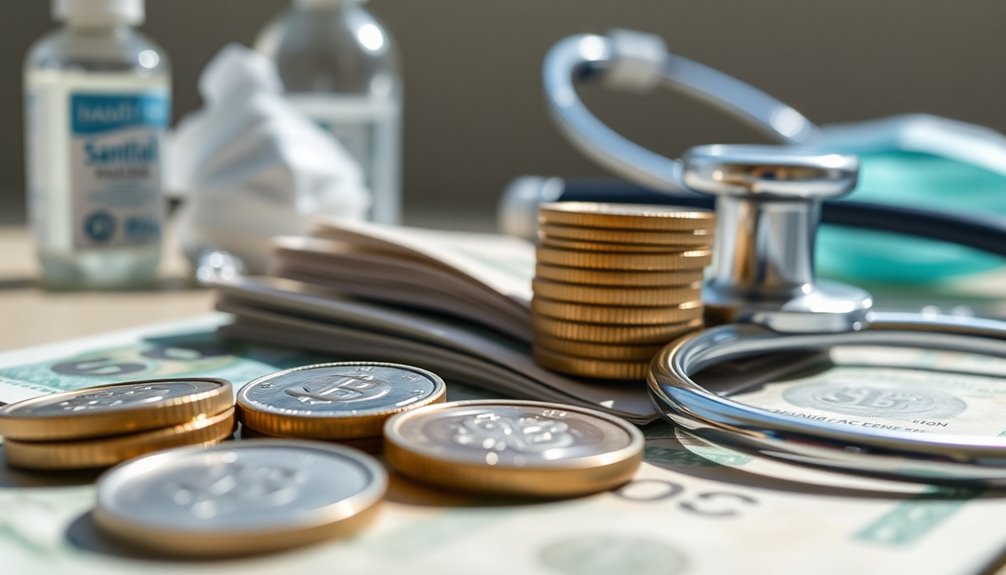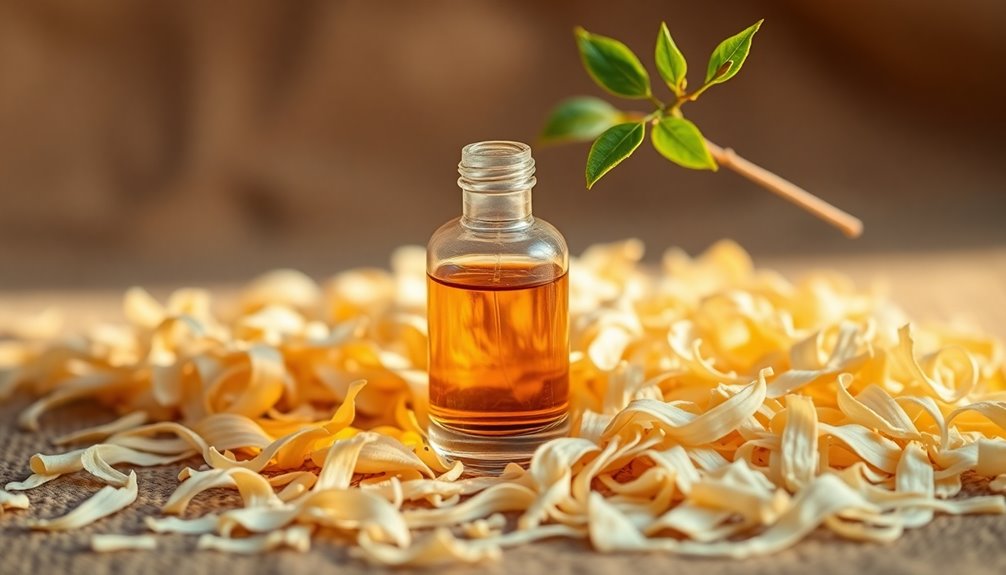Money has a unique smell that's shaped by its materials and the experiences it has gone through. Newly printed bills emit a scent from cotton, linen, and the inks used, featuring notes like linseed oil and gum arabic. As bills age, they can accumulate odors from dirt and oils, often leading to unpleasant smells. The environment also plays a role; in cafes or busy markets, the scent of money mingles with other aromas. You might notice that money can evoke feelings of success or nostalgia. To understand more about this intriguing aspect of cash, keep exploring its nuances!
Key Takeaways
- Freshly printed money emits a scent with notes of linseed oil and gum arabic due to its cotton and linen composition.
- Aging bills develop a distinct odor from chemical breakdown and accumulated residues, often leading to an unpleasant smell.
- Currency can harbor bacteria and pathogens, raising hygiene concerns and affecting its scent over time.
- Different environments influence money's aroma, blending with other scents, such as coffee or food, enhancing its perception.
- Cultural associations with money's smell vary, evoking feelings of prosperity, nostalgia, or even greed depending on societal attitudes.
Introduction

Have you ever noticed how money has a smell? It's an intriguing aspect of currency that often goes unnoticed. When you handle freshly printed bills, you can catch a distinct aroma, primarily due to its chemical composition. This scent arises from the blend of cotton and linen fibers, as well as the volatile organic compounds (VOCs) found in the inks used. As you explore this olfactory phenomenon, you might find that the smell of money evokes emotions tied to wealth and power, largely thanks to linseed oil and gum arabic.
However, the smell changes as bills circulate. Over time, they accumulate residues from handling, like oils and skin cells, leading to the less appealing odor often referred to as "filthy lucre." If you think back to historical contexts, early paper currencies had different materials affecting their scent, while coins made from precious metals emitted a metallic odor.
Understanding the smell of money reveals its psychological impact on consumer behavior. Positive associations tied to its scent can enhance feelings of financial success and nostalgia, influencing how you perceive and interact with currency during transactions.
Description of the Smell

The aroma of money offers a fascinating blend of scents that can evoke strong reactions. When you catch a whiff of freshly printed bills, you might notice distinct notes of linseed oil and gum arabic. These volatile organic compounds (VOCs) are emitted from the cotton and linen blend used in currency production, creating a unique scent profile that's hard to forget.
As bills age, their smell changes dramatically. You'll find that older notes develop an odor reminiscent of a mix of paper and oils, thanks to the chemical breakdown of the materials over time. However, when you handle circulated currency, you may encounter less pleasant aromas. Accumulated dirt, oils, and skin cells from countless hands often lead to the colloquial term "filthy lucre," which describes the unpleasant scents associated with well-worn money.
Interestingly, historical paper currencies had their own scent signatures, influenced by different materials and treatments. Some older notes were even infused with scents to aid in identification. Thus, the smell of money is not just about what's new; it also tells a story of its journey through time and touch.
Source and Composition

Understanding the source and composition of currency reveals why it has such a distinctive smell. Currency is primarily made from a blend of cotton and linen, which not only gives it a unique texture but also contributes to its scent. The inks used in printing banknotes contain various chemical compounds that further influence how money smells.
One key aspect of this aroma is linked to volatile organic compounds (VOCs) emitted from the materials in its production. These organic compounds are a result of the breakdown of the currency's chemical components as it ages, intensifying that familiar odor.
Moreover, currency can carry residues from handling and environmental exposure, which can alter its scent over time. If you've ever noticed that a fresh stack of bills smells different from an old, crumpled one, this is why.
Interestingly, systems like the Bulk Currency Detection System rely on the unique properties of these materials to authenticate banknotes. So next time you catch a whiff of money, remember that its smell is a complex blend of its source and composition.
Typical Scenarios or Environments

Walking into a bustling café, you might catch a whiff of freshly printed money mingling with the aroma of roasted coffee beans. This unique scent often highlights different scenarios where money plays a significant role. Imagine standing in a busy marketplace, surrounded by vendors exchanging bills, and you can almost sense the combination of excitement and the faint, oily scent of circulated currency.
In retail environments, cash registers clink with the sound of bills and coins, releasing a mix of smells—old paper, skin cells, and even traces of food. Even though you might not find the scent pleasant, it's an undeniable part of the experience.
During a night out, the smell of money can linger in crowded bars where transactions happen frequently. For security reasons, establishments often use freshly printed money, which adds a fresh note to the air.
As you navigate through these environments, you realize that the scent of money isn't just about wealth; it's a reflection of the interactions and exchanges that shape our daily lives. Each whiff tells a story, connecting you to the world of finance and commerce, with all its complexities.
Emotional or Cultural Associations

Experiencing the scent of money can stir up a range of emotions and cultural associations that go beyond mere transactions. The smell of freshly printed currency, composed of linseed oil and gum arabic, often evokes feelings of productivity and financial success for you. This scent can influence your perception of wealth and prosperity, reinforcing the emotional connection many have with money.
Research shows that olfactory cues, like the aroma of cash, can trigger nostalgic feelings tied to past financial experiences, impacting your consumer behavior. When you catch a whiff of that familiar scent, it might lead to positive associations with economic power, boosting your confidence in spending.
Culturally, the perception of money's smell varies significantly. Different societies attach unique meanings and emotional responses to this scent, shaping how people react to money. Marketers recognize this and frequently leverage sensory elements, including the scent of money, to create emotional connections with you and enhance brand loyalty. Ultimately, the emotional and cultural associations tied to the scent of money play a crucial role in shaping your attitudes and behaviors toward financial transactions.
Health or Safety Considerations

Cash, while often associated with wealth, can pose significant health risks. Studies show that currency often carries a staggering number of bacteria and pathogens, sometimes harboring more germs than common surfaces like door handles and light switches. When you handle cash, you not only touch the bills but also contribute to the unpleasant odors they can accumulate. Money collects oils, skin cells, and food particles, raising serious hygiene concerns.
The World Health Organization has warned that cash can act as a vector for disease transmission, especially in crowded or public settings. This risk is compounded by the fact that many people express discomfort when handling cash due to these health concerns. Cleaning practices can help; however, disinfecting methods might alter the cash's smell and perceived cleanliness.
Ultimately, the public's perception of cleanliness associated with money can discourage its use, leading many to prefer digital transactions. If you're still using cash, consider the hygiene implications and be mindful of how often you handle it. Keeping your hands clean and possibly limiting cash transactions can help mitigate these health risks.
Final Thoughts

The allure of money goes beyond its tangible value; it encompasses a complex interplay of scent, hygiene, and psychological influence. The smell of money, primarily derived from volatile organic compounds (VOCs) in the inks and fabrics used in currency, has a unique and evolving aroma. Freshly printed bills emit a fresh scent from linseed oil and gum arabic, but as they circulate, they absorb various residues, altering their olfactory signature.
While the distinct smell can evoke feelings of wealth and power, it's essential to recognize the negative associations that can accompany it. The scent of circulated money may carry bacteria and pathogens, raising concerns about hygiene. This duality influences consumer behavior—while some are drawn to the allure of money's fragrance, others might hesitate due to cleanliness issues.
Frequently Asked Questions
What Is the Smell on Money?
When you handle money, you might notice a distinct scent that's hard to ignore. It's a mix of cotton, linen, and the inks used in printing, which release volatile organic compounds. Freshly printed bills give off a slightly sweet smell due to linseed oil and gum arabic. Over time, as the currency circulates, it can pick up odors from skin oils and food, leading to a less pleasant aroma.
What Scent Smells Like Money?
When you think about a scent that smells like money, you might imagine something fresh and crisp, perhaps reminiscent of new beginnings. It often evokes feelings of success and prosperity. Some might associate it with the smell of clean paper or even a subtle hint of ink. Certain fragrances marketed as "luxury" can mimic this vibe, aiming to tap into that emotional connection you have with wealth and financial accomplishment.
How Do You Get the Smell of Money?
To get the smell of money, you'll want to handle fresh bills or spend time around cash. The aroma comes from the materials and inks used in printing. You might also notice a stronger scent on older bills, as they've absorbed oils and residues over time. If you're looking to recreate that smell, try using scented oils that mimic the chemical notes found in currency or explore scented candles designed to evoke the essence of money.
Why Do I Keep Smelling Money?
If you keep smelling money, it might be your brain's way of linking that scent to financial success or security. You could be subconsciously associating it with past experiences, like receiving cash gifts or making a big purchase. Alternatively, it might be a heightened awareness of your financial situation, prompting you to notice scents related to currency. Trust your instincts; your mind might be reminding you to focus on your financial goals and aspirations.









